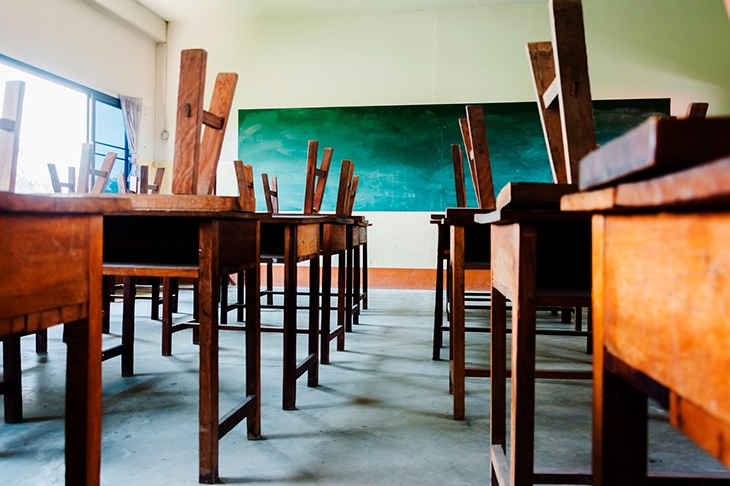It would be a tragedy if one of the legacies of Covid-19 — a disease which hardly affects children physically — was a widening of the already broad gap in educational attainment between rich and poor. But sadly, the damage is already well under way.
Back in March, Britain was the European country most keen to keep its schools open in the face of the then-burgeoning number of Covid-19 cases. Now it is the other way around. In Denmark, primary schools have been open for a month. This week, children began to return to class in Germany, France and the Netherlands. Next week, schools will start to reopen in Belgium. Yet in Britain, the earliest date we have been given for reopening schools is 1 June, and then only for some children in primary schools. A full reopening is not expected until September.
Even that date could be in doubt, if some unions are allowed to have their way. The National Education Union, in particular, has sought to block the reopening of schools, instigating a petition to keep them closed. As so often in such disputes, the welfare of the children barely features in this debate: it’s all about the adults.
Reopening schools is not entirely without risk — nothing is — but the evidence suggests that children are mainly unaffected by the virus and there is no evidence of pupils being super-spreaders. An Icelandic study tracking the country’s 1,801 cases of Covid-19 — studying the mutations to see who gave which virus to whom — failed to find a single example of a child passing the virus on to their parents. The Royal College of Paediatrics and Child Health has come to a similar conclusion: in a review of evidence worldwide it couldn’t find a single documented case of a child under ten passing Covid-19 to an adult.
There is no doubt, however, about the permanent damage that school closures inflict. The children of the wealthy will fare far better than households that might not have a spare laptop for every child. One in five pupils is brought up by a single parent, and many will struggle to combine a job with home-schooling. Many children do not have a quiet place to work at home, and some will not have internet access — 7 per cent of households still do not have broadband, according to the Office for National Statistics. No serious study into this has been released by the government.
Today, an ad hoc system of remote education prevails. Many of the best state schools — along with private schools — were quick to transfer lessons online, replicating the school day as best they could. But there appears to be a wide variation in the quality of what is being offered — and no system for checking who is doing what. One teacher survey found that three-quarters of those in private secondaries have hosted an online lesson where pupils can speak. Just 6 per cent of teachers in state secondaries have had the chance to do so.
The first reaction of Ofsted, come the school closures in March, was to shut up shop and suspend its inspections. It should instead devote itself to a new digital regime, setting minimum standards and making sure schools are adhering to them. There is much at stake. A Norwegian study found that every week a child misses out on formal education reduces their chances of going to university and lowers their lifetime earning potential. Strong remote learning methods can offset the damage. But more needs to be done to ensure this is available to all pupils, not just the lucky few.
As well as opposing the re-opening of schools, the National Education Union is simultaneously opposing remote learning for primary schools over the internet. It offers advice on how to sue schools that are too keen to reopen their doors. But blaming unions serves no purpose. The government should have appreciated the problem from the moment it ordered the closure of schools, and set a minimum level of education they would be expected to continue to provide.
The plan to keep schools open for children of key workers and those with special educational needs or safeguarding issues has been a failure. Ministers assumed 20 per cent of pupils would show up during lockdown, as they were entitled to. Just 2 per cent did. Making school attendance optional for such groups has been a failure. Making it compulsory is the best way to clarify the government’s message and protect the children involved.
It is less than six months since this government came to office promising to ‘level up’ the country. For obvious reasons, it is difficult to get on with delivering manifesto promises while the country is dealing with a pandemic. But at the very least the government should be aware of the damage that the lockdown is doing to the cause of raising educational attainment among the least well-off — and should have devised a strategy to counter it. In the case of some children there is far more risk in keeping schools closed — the requirement for school attendance is a vital part of the child protection system. The neglect and abuse which has gone under the radar during these weeks of lockdown will only gradually become apparent. This is why, as we come out of lockdown, the reopening of schools should be the first priority.
Got something to add? Join the discussion and comment below.
Get 10 issues for just $10
Subscribe to The Spectator Australia today for the next 10 magazine issues, plus full online access, for just $10.
You might disagree with half of it, but you’ll enjoy reading all of it. Try your first month for free, then just $2 a week for the remainder of your first year.














Comments
Don't miss out
Join the conversation with other Spectator Australia readers. Subscribe to leave a comment.
SUBSCRIBEAlready a subscriber? Log in